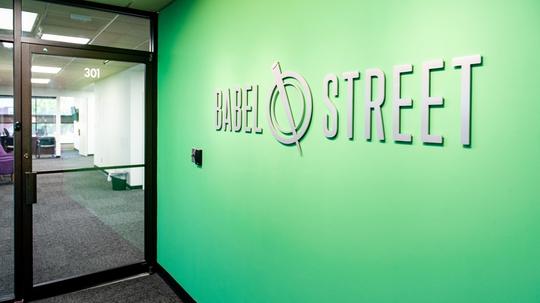
On the heels of a busy 2019, Reston, Va.-based Babel Street doesn’t plan on slowing down.
In the past year the company, which specializes in data aggregation, analytics and translation, got a spot on a mega-contract with the Department of Justice, launched a number of new products and made more of its offerings available in the commercial space. CEO Jeffrey Chapman said the company plans to introduce more tailored services, open more offices and increase its headcount in the coming year.
Founded in 2012, Babel Street’s signature product is Babel X, a cloud-based service that scours various public or private data sources for insights that its clients would find useful. Data sources include social media, traditional media and the dark web, among others.
The uses clients have for discovered data run the gamut, Chapman says. A company might organize a response to negative sentiment about it on Twitter. It could be exploring vulnerabilities in a certain region where it wants to expand its supply chain. Clients have used it to track down compromised accounts and passwords. The service has presented solutions to more benign problems, too.
“There have been times where people responded pretty quickly because people at a sporting event were complaining about long lines to get in. And the staff was able to get in front of them and explain that, ‘Hey, there are lines on the other side of the stadium; if you walk five minutes, you’ll get in a lot faster,’” Chapman told DC Inno.
Analyzing large troves of data is one thing, but Chapman said Babel Street’s standout feature is its versatility with more than 200 languages. Customers can search for something in their native language and find results in nearly any foreign language. The capability has been developed and honed for more than a decade. Chapman boasts that Babel Street draws from “one of the largest ontologies in the world” to allow it to catch even slight nuances in language, with only the occasional need for human quality control.
“Our machine learning and AI are constantly scouring the web looking for new vernacular on the product slang that means certain sentiments,” Chapman said.
While based in Reston, Babel Street has offices in the United Kingdom, Australia and New Zealand. Some employees work from the United Kingdom, and the company is looking to open a standalone European office in the near future, Chapman said. The company has more than 100 employees and hopes to add another third on top of that, he said.
“The assets of our company get on the elevator and go home every day. They have lives outside of Babel Street, and that's the real core of us,” he said. “We've been very proud and lucky to grow our tribe here.”
The company has also grown the past year with several new products and features beyond Babel X. And where it historically has focused on government clients, the company has been expanding to cater more to commercial clients. It expanded Babel BOX, a separate service that is installed on a client’s private network to analyze internal data sources, to commercial enterprises. It also launched Babel Channels, a curated service that lets users subscribe to insights about a particular topic.
“We're looking for areas where there's a lot of people looking at the same topic and could use that information over and over again,” Chapman said of Babel Channels. “You just go in and say ‘I want to subscribe to this channel.’ So if it's ‘top economist blogs in the world,’ boom, there you go. If it’s 'breaking news in D.C.,' great. If it’s 'chemical spills in all of North America,' then you'll get that channel.”
More custom-tailored capabilities are in the works, Chapman said. The company is working on soon providing some of its features as APIs or in containerized versions for clients that use Babel Street’s search functions but need more manual control of the data that comes in.
In October, Babel Street announced that it’s taking part in a five year, $500 million blanket purchase agreement for the DOJ. Working alongside SAS, Deloitte, Four Points Technology and other partners on the contract, Babel Street will help the DOJ sift through and analyze any information in its holdings.
“It's not a surprise to anybody that the Department of Justice has a lot of text-based documents that they're trying to make sense of, some of them in foreign languages, and some of them maybe in vernacular that's not easily understood,” Chapman said. “So that's the role that we see ourselves playing."
Earlier this year, Babel Street renewed contracts with Intel471 and DarkOwl, two companies that specialize in tracking malware and monitoring for insights from the dark web. The partnerships enable Babel Street to funnel results for its customers from relatively inaccessible data sources.
“The value prop was the same then it is now, but we've gotten better from a technological capability in delivering it,” Chapman said of how the company has changed since its founding. He said that it’s always been about giving people access to information that is inaccessible because it’s in a foreign language, behind closed doors or some other reason. “And so really, what we want to do is democratize access to information.”




